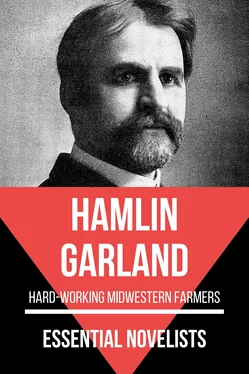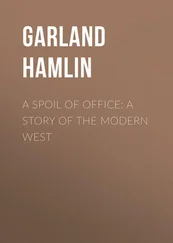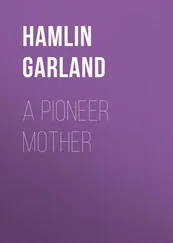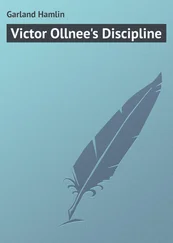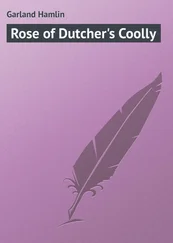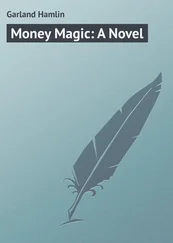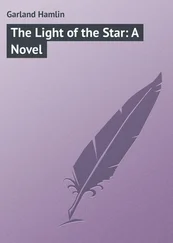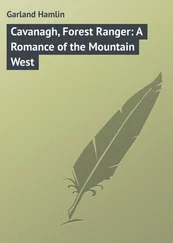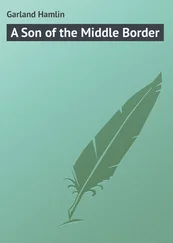Meanwhile, on a little rise of ground near the road, neighbor Gammons and John Bowers were building our next home. It did not in the least resemble the foundation of an everlasting family seat, but it deeply excited us all. It was of pine and had the usual three rooms below and a long garret above and as it stood on a plain, bare to the winds, my father took the precaution of lining it with brick to hold it down. It was as good as most of the dwellings round about us but it stood naked on the sod, devoid of grace as a dry goods box. Its walls were rough plaster, its floor of white pine, its furniture poor, scanty and worn. There was a little picture on the face of the clock, a chromo on the wall, and a printed portrait of General Grant—nothing more. It was home by reason of my mother's brave and cheery presence, and the prattle of Jessie's clear voice filled it with music. Dear child,—with her it was always spring!
School Life
Our new house was completed during July but we did not move into it till in September. There was much to be done in way of building sheds, granaries and corn-cribs and in this work father was both carpenter and stone-mason. An amusing incident comes to my mind in connection with the digging of our well.
Uncle David and I were "tending mason," and father was down in the well laying or trying to lay the curbing. It was a tedious and difficult job and he was about to give it up in despair when one of our neighbors, a quaint old Englishman named Barker, came driving along. He was one of these men who take a minute inquisitive interest in the affairs of others; therefore he pulled his team to a halt and came in.
Peering into the well he drawled out, "Hello, Garland. W'at ye doin' down there?"
"Tryin' to lay a curb," replied my father lifting a gloomy face, "and I guess it's too complicated for me."
"Nothin' easier," retorted the old man with a wink at my uncle, "jest putt two a-top o' one and one a-toppo two—and the big eend out,"—and with a broad grin on his red face he went back to his team and drove away.
My father afterwards said, "I saw the whole process in a flash of light. He had given me all the rule I needed. I laid the rest of that wall without a particle of trouble."
Many times after this Barker stopped to offer advice but he never quite equalled the startling success of his rule for masonry.
The events of this harvest, even the process of moving into the new house, are obscured in my mind by the clouds of smoke which rose from calamitous fires all over the west. It was an unprecedentedly dry season so that not merely the prairie, but many weedy cornfields burned. I had a good deal of time to meditate upon this for I was again the plow-boy. Every day I drove away from the rented farm to the new land where I was cross-cutting the breaking, and the thickening haze through which the sun shone with a hellish red glare, produced in me a growing uneasiness which became terror when the news came to us that Chicago was on fire. It seemed to me then that the earth was about to go up in a flaming cloud just as my grandad had so often prophesied.
This general sense of impending disaster was made keenly personal by the destruction of uncle David's stable with all his horses. This building like most of the barns of the region was not only roofed with straw but banked with straw, and it burned so swiftly that David was trapped in a stall while trying to save one of his teams. He saved himself by burrowing like a gigantic mole through the side of the shed, and so, hatless, covered with dust and chaff, emerged as if from a fiery burial after he had been given up for dead.
This incident combined with others so filled my childish mind that I lived in apprehension of similar disaster. I feared the hot wind which roared up from the south, and I never entered our own stable in the middle of the day without a sense of danger. Then came the rains—the blessed rains—and put an end to my fears.
In a week we had forgotten all the "conflagrations" except that in Chicago. There was something grandiose and unforgettable in the tales which told of the madly fleeing crowds in the narrow streets. These accounts pushed back the walls of my universe till its far edge included the ruined metropolis whose rebuilding was of the highest importance to us, for it was not only the source of all our supplies, but the great central market to which we sent our corn and hogs and wheat.
My world was splendidly romantic. It was bounded on the west by The Plains with their Indians and buffalo; on the north by The Great Woods, filled with thieves and counterfeiters; on the south by Osage and Chicago; and on the east by Hesper, Onalaska and Boston. A luminous trail ran from Dry Run Prairie to Neshonoc—all else was "chaos and black night."
For seventy days I walked behind my plow on the new farm while my father finished the harvest on the rented farm and moved to the house on the knoll. It was lonely work for a boy of eleven but there were frequent breaks in the monotony and I did not greatly suffer. I disliked cross-cutting for the reason that the unrotted sods would often pile up in front of the coulter and make me a great deal of trouble. There is a certain pathos in the sight of that small boy tugging and kicking at the stubborn turf in the effort to free his plow. Such misfortunes loom large in a lad's horizon.
One of the interludes, and a lovely one, was given over to gathering the hay from one of the wild meadows to the north of us. Another was the threshing from the shock on the rented farm. This was the first time we had seen this done and it interested us keenly. A great many teams were necessary and the crew of men was correspondingly large. Uncle David was again the thresher with a fine new separator, and I would have enjoyed the season with almost perfect contentment had it not been for the fact that I was detailed to hold sacks for Daddy Fairbanks who was the measurer.
Our first winter had been without much wind but our second taught us the meaning of the word "blizzard" which we had just begun to hear about. The winds of Wisconsin were "gentle zephyrs" compared to the blasts which now swept down over the plain to hammer upon our desolate little cabin and pile the drifts around our sheds and granaries, and even my pioneer father was forced to admit that the hills of Green's Coulee had their uses after all.
One such storm which leaped upon us at the close of a warm and beautiful day in February lasted for two days and three nights, making life on the open prairie impossible even to the strongest man. The thermometer fell to thirty degrees below zero and the snow-laden air moving at a rate of eighty miles an hour pressed upon the walls of our house with giant power. The sky of noon was darkened, so that we moved in a pallid half-light, and the windows thick with frost shut us in as if with gray shrouds.
Hour after hour those winds and snows in furious battle, howled and roared and whistled around our frail shelter, slashing at the windows and piping on the chimney, till it seemed as if the Lord Sun had been wholly blotted out and that the world would never again be warm. Twice each day my father made a desperate sally toward the stable to feed the imprisoned cows and horses or to replenish our fuel—for the remainder of the long pallid day he sat beside the fire with gloomy face. Even his indomitable spirit was awed by the fury of that storm.
So long and so continuously did those immitigable winds howl in our ears that their tumult persisted, in imagination, when on the third morning, we thawed holes in the thickened rime of the window panes and looked forth on a world silent as a marble sea and flaming with sunlight. My own relief was mingled with surprise—surprise to find the landscape so unchanged.
Читать дальше
